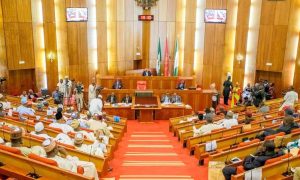The International Monetary Fund has raised concerns over the lack of a robust social safety net to protect poor Nigerians from the adverse effects of ongoing economic reforms.
In an article published on its website on Monday, the Fund said that although Nigeria has made progress with recent reforms, poverty and food insecurity remain widespread, and the absence of a proper social buffer poses a risk to inclusive growth.
The article, jointly written by the IMF’s Mission Chief to Nigeria, Axel Schimmelpfennig, and its Resident Representative in Nigeria, Christian Ebeke, stressed that while policy shifts undertaken since 2023 have started to yield positive results, millions of Nigerians are yet to feel the impact.
“Nigeria lacks an effective social safety net to cushion the impact of shocks on the most vulnerable,” the IMF said, noting that scaling up the existing cash transfer system would be key to making growth more inclusive.
The Bretton Woods institution noted that the Bola Tinubu administration inherited a challenging economy marked by weak growth, falling per capita income, and rising poverty.



























